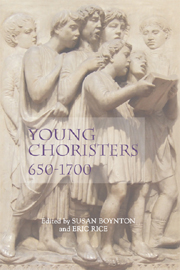Book contents
- Frontmatter
- Contents
- List of Illustrations
- List of Musical Examples
- Acknowledgements
- Dedication
- Introduction: Performance and Premodern Childhood
- 1 The Boy Singers of the Roman Schola Cantorum
- 2 Boy Singers in Medieval Monasteries and Cathedrals
- 3 The Musical Education of Young Girls in Medieval English Nunneries
- 4 Choirboys in Early English Religious Drama
- 5 From Mozos de coro towards Seises: Boys in the Musical Life of Seville Cathedral in the Fifteenth and Sixteenth Centuries
- 6 The Seeds of Medieval Music: Choirboys and Musical Training in a Late-Medieval Maîtrise
- 7 Choirboys in Cambrai in the Fifteenth Century
- 8 Choirboys and Vicaires at the Maîtrise of Cambrai: A Socio-anthropological Study (1550–1670)
- 9 Choirboys, Memorial Endowments and Education at Aachen's Marienkirche
- 10 Thomas Mulliner: An Apprentice of John Heywood?
- 11 Cantando tutte insieme: Training Girl Singers in Early Modern Sienese Convents
- 12 Choirboys in Early Modern Rome
- General Bibliography
- Index
7 - Choirboys in Cambrai in the Fifteenth Century
Published online by Cambridge University Press: 12 September 2012
- Frontmatter
- Contents
- List of Illustrations
- List of Musical Examples
- Acknowledgements
- Dedication
- Introduction: Performance and Premodern Childhood
- 1 The Boy Singers of the Roman Schola Cantorum
- 2 Boy Singers in Medieval Monasteries and Cathedrals
- 3 The Musical Education of Young Girls in Medieval English Nunneries
- 4 Choirboys in Early English Religious Drama
- 5 From Mozos de coro towards Seises: Boys in the Musical Life of Seville Cathedral in the Fifteenth and Sixteenth Centuries
- 6 The Seeds of Medieval Music: Choirboys and Musical Training in a Late-Medieval Maîtrise
- 7 Choirboys in Cambrai in the Fifteenth Century
- 8 Choirboys and Vicaires at the Maîtrise of Cambrai: A Socio-anthropological Study (1550–1670)
- 9 Choirboys, Memorial Endowments and Education at Aachen's Marienkirche
- 10 Thomas Mulliner: An Apprentice of John Heywood?
- 11 Cantando tutte insieme: Training Girl Singers in Early Modern Sienese Convents
- 12 Choirboys in Early Modern Rome
- General Bibliography
- Index
Summary
IN the late fourteenth and fifteenth centuries, the city of Cambrai was one of the most important musical centers in what is now northern France and Belgium. The city was the political and religious hub of an immense diocese that extended east as far as Brussels and Antwerp, and its cathedral was regarded as one of the architectural wonders of the entire region. The cathedral was richly endowed, supporting fifty prebendary canons and a large number of chaplains, but there were also two important collegiate churches in the city with an active musical life: the church of Ste. Croix, which was technically a dependent of the cathedral boasting ten canons and a number of chaplains, and the parish church of St. Géry, which was built on a hill just outside the walls and supported some thirty canons and a small number of chaplains. All three of these churches maintained an active maîtrise, recruiting and training choirboys. The documentation from all three churches survives, though with relatively large lacunae, and in all three cases there is enough information to permit the drawing of a provisional picture of the education and the careers of the choirboys in each of these establishments.
At the outset it may be useful to describe the nature of the primary sources as they survive. The richest material with regard to information about choirboys comes from three areas within the cathedral's primary sources. First, there are the chapter acts from 1364 to 1503, which survive in fifteen volumes.
- Type
- Chapter
- Information
- Young Choristers, 650–1700 , pp. 123 - 145Publisher: Boydell & BrewerPrint publication year: 2008



